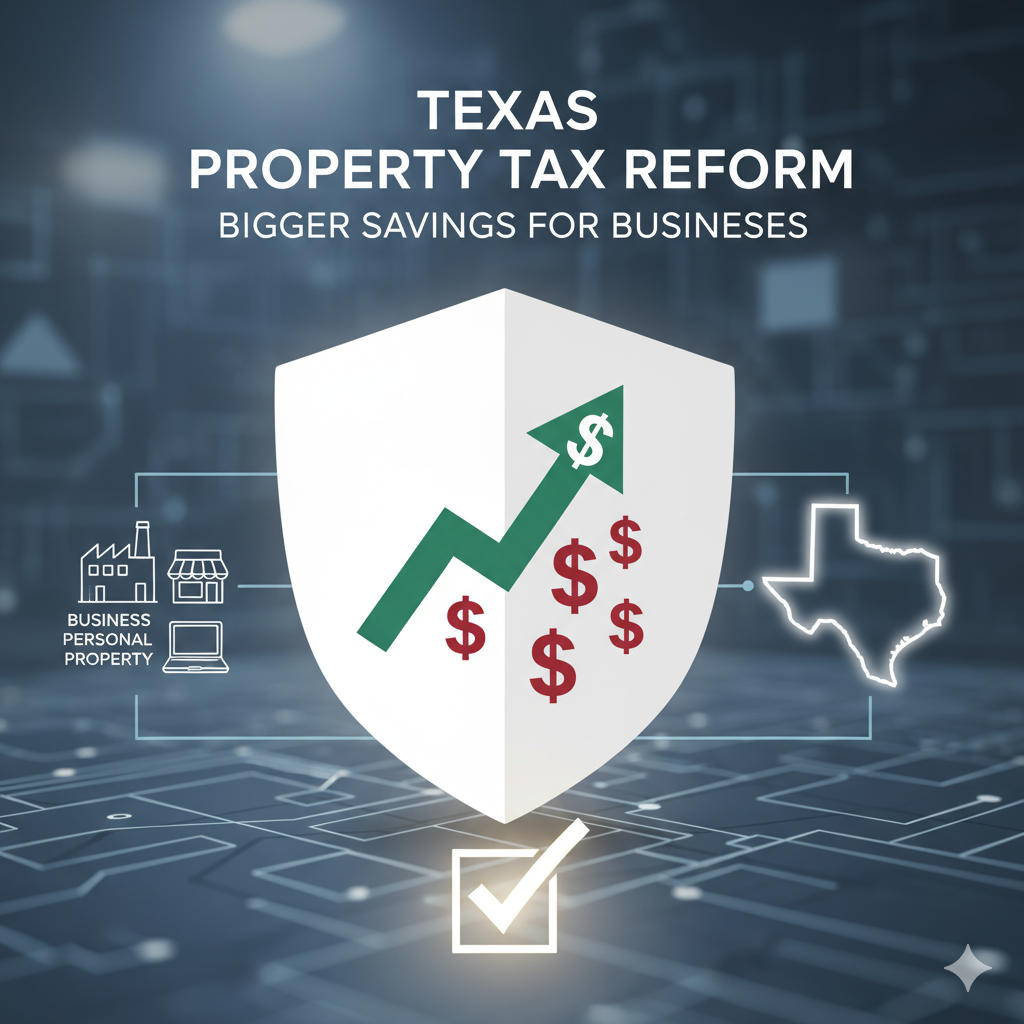Texas Businesses Win Big: Proposition 9 Passes, Slashing Business Personal Property Taxes
/Texas business owners received outstanding news on November 4, 2025. Voters overwhelmingly approved Proposition 9, a constitutional amendment that enacts one of the most significant business property tax cuts in a generation.
This new law, which takes effect for the tax year beginning January 1, 2026, dramatically increases the Business Personal Property (BPP) exemption from a mere $2,500 to $125,000.
This is not just a minor adjustment; it fundamentally changes who pays this tax and how it's calculated. Here is what the passage of Prop 9 means for your business.
How Your Business is Impacted
The new law (HB 9) creates two different, but equally positive, outcomes depending on the size of your business.
Scenario 1: For Businesses with $125,000 or Less in BPP
(E.g., Family office, home office, small retail shops, independent contractors, professional services, startups)
For hundreds of thousands of small businesses, this law effectively eliminates the BPP tax entirely.
Tax Liability: Your BPP tax liability will drop to $0.
Compliance Win: You will no longer be required to file the complex and time-consuming annual BPP rendition (Form 50-144) with your county appraisal district.
Note: Appraisal districts may still require a one-time, simplified "statement" to claim the exemption, but the annual filing burden is gone.
Economic Impact: A business with $75,000 in equipment and inventory, which previously paid taxes on $75,000 of value, will now save 100% of that cost. This is a direct, bottom-line saving that also removes a major administrative headache.
Scenario 2: For Businesses with More than $125,000 in BPP
(E.g., Multi-location businesses, manufacturers, large office-based and/or equipment based companies)
For larger businesses, the new law provides a material, "stackable" deduction. This is the most critical detail:
The $125,000 exemption applies to the BPP value at each separate physical location (or "taxable situs") your business operates within a local government taxing unit’s area.
Old Rule: Under the old $2,500 "threshold" rule, a business with $2,000,000 in BPP received no exemption and paid tax on the full $2,000,000.
New Rule: That same business now receives a $125,000 deduction at each of its locations.
The "Per Location" Benefit: The law states the exemption applies to "each separate location" where you hold property. If your business operates five retail stores in Harris County, you can claim five separate $125,000 exemptions (one for the property at each store). This is why accurate asset tracking by physical address is now more important than ever.
Economic Illustration:
Let's look at "XYC Corp," which has $2,000,000 in total BPP in Harris County Appraisal District, with an assumed combined tax rate of 2.5% from all XYC Corp’s taxing units (locations).
Illustration of the application of the new texas business personal property tax exemption per location.
The "Related Business" Limitation: The legislature anticipated that a business might try to claim multiple exemptions at a single address by creating different legal entities (e.g., "XYC Inc." and "XYC Services LLC") at the same location. The law prevents this. It requires that all property owned by "related business entities" that are part of a "common business enterprise" at the same physical location must be aggregated (combined) and treated as one. In short, you get one $125,000 exemption per physical address, regardless of how many of your related companies operate there.
Your Action Plan for 2026
The new law applies to your 2026 taxes, which means the preparation starts now.
If You're BPP is Under the $125,000 Limit: Confirm the new process with your local appraisal district (e.g., HCAD, DCAD, TCAD) in early 2026. Be prepared to file a one-time form to certify your exempt status.
If You're a Multi-Location Business: Your immediate action item is to review your fixed asset ledger. You must be able to accurately segregate and report your BPP (machinery, equipment, computers, furniture, inventory) by its specific physical address. Failure to do so means you will miss out on thousands in "stackable" exemptions. Contact your tax advisor now to ensure your 2026 rendition is structured to maximize this new benefit.
The Constitutional Amendment Text
The new law was created by two pieces of legislation working in concert: the constitutional amendment (Proposition 9) and the enabling bill that defines the rules. See:
H.J.R. 1 (The Constitutional Amendment): https://capitol.texas.gov/tlodocs/89R/billtext/html/HJ00001F.htm
H.B. 9 (The Enabling Law with Specific Rules): https://capitol.texas.gov/tlodocs/89R/billtext/html/HB00009F.htm
Disclaimer: The information provided in this blog post is for informational purposes only and is not intended as legal, tax, or financial advice. Tax laws are complex and subject to change. This information is based on legislation passed in 2025 and effective for the 2026 tax year. Please consult with your own professional tax advisor and legal counsel to understand how this new law impacts your specific business situation and to ensure compliance.


